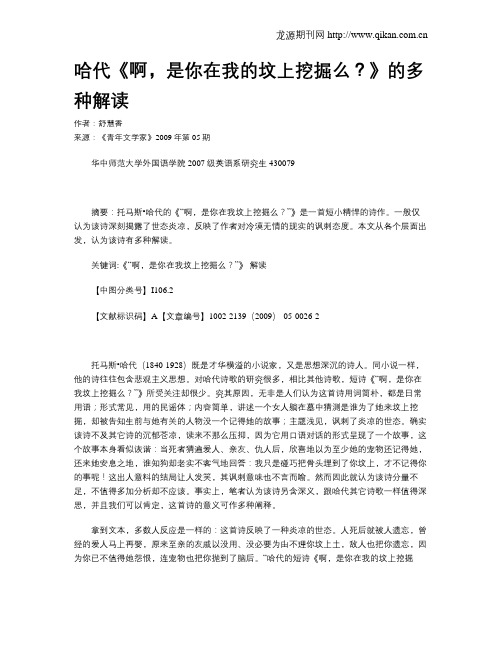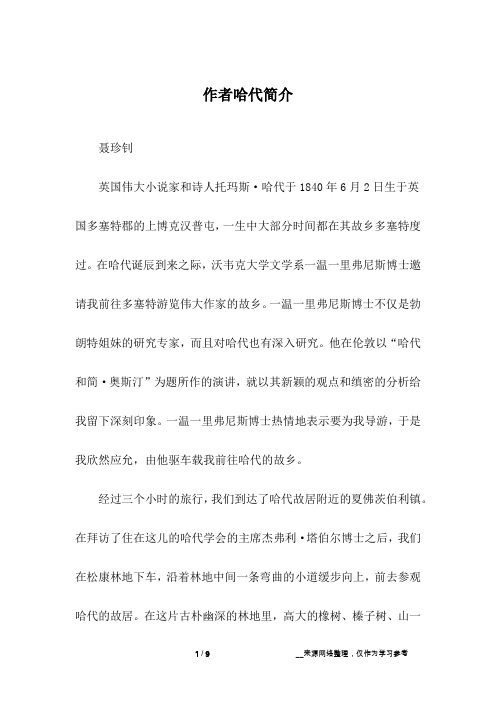托马斯哈代 the man he killed
托马斯.哈代(诗歌)

[英]哈代著徐志摩译二里头扫校我国现代著名诗人徐志摩,曾在一篇文章中说:“我不讳我的…英雄崇拜‟”。
他的所谓“英雄”,是这样一些人物,近现代的,有印度大诗人泰戈尔,法国作家罗曼·罗兰,意大利诗人邓南遮,还有,英国的托玛斯·哈代……他的理由:“山,我们爱踹高的;人,我们为什么不愿意接近大的?”对于这些英雄,他不仅阅读、翻译他们的作品,而且,“在我有力量爬的时候,总不教放过一个…登高‟的机会。
”他想亲炙他们,“多瞻仰几个英雄。
”这种向往,促成了他与英国大作家托玛斯·哈代的一次会面。
哈代虽然被公认为英国重要的小说家之一,他的长篇小说《还乡》、《无名的裘德》,尤其代表作《苔丝》,为他赢得了巨大的声誉,可在早期,以及后期,他的诗作,却出色地表现出他“真纯的人生哲学”。
正是这些诗作,最早吸引了中国诗人徐志摩,使他终身,都将哈代当作“属于任何时代”的“英雄”崇拜着。
一在徐志摩的翻译诗作过程中,数量最多的,似乎就是哈代了,达到了数十首。
时间,最早发表出的,是在1923年。
当年11月10日的《小说月报》上,刊出了徐志摩翻译的两首哈代的诗作。
1924年,他又先后翻译发表了四首哈代诗作。
1925年3月的《语丝》杂志,又刊出他翻译的哈代诗作《在一家饭店》;1926年5月20日《晨报副刊·诗镌》中,刊出了《厌世的哈提(即哈代)》一文。
为了印证自己的观点,徐志摩一口气翻译出四首哈代诗作。
至此,有关翻译的介绍可以暂时告一段落。
因为随后不久的当年夏天,徐志摩就奔赴欧洲,在英国学者、剑桥大学王家学院教授狄更生的介绍下,见到了他心仪的“英雄”——托玛斯·哈代。
在未见到哈代本人之前,徐志摩曾经根据一些文章的描述和一点想象,为哈代画了一张像:“如其你早几年,也许就是现在,到多切斯特的乡下,你或许碰到…裘德‟的作者,一个和善可亲的老者,穿着短裤便服,精神飒爽的,短短的脸面,短短的下颌,在街道上闲暇的走着,招呼着,答话着,你如其过去问他卫撒克士小说里的名胜,他就欣欣地从详指点讲解;回头他一扬手,已经跳上了他的自行车,按着车铃,向人丛里去了。
HardyandTess托马斯·哈代简介和作品赏析

苔丝被塑造成一个纯洁、善良、坚强的女性形象,她的遭遇反映了当时社会对 女性的压迫和束缚;而亚雷和安吉尔则分别代表了社会中的邪恶势力和虚伪道 德,他们的行为对苔丝的命运产生了深远影响。
艺术特色及文学价值
艺术特色
哈代在小说中运用了现实主义的手法,通过细腻的描写和生动的叙述,展现了19 世纪末英国农村的生活面貌和人们的内心世界。同时,他还巧妙地运用了象征、 隐喻等修辞手法,使作品具有深厚的艺术内涵。
06
托马斯·哈代在文学史上的地位 和影响
对当时社会现象反映和批判
揭示社会不公
哈代的作品中经常描写社会的不 公现象,如贫富差距、阶级矛盾 等,通过人物性格和命运的塑造 ,深刻反映了当时社会的弊端。
批判传统观念
哈代在作品中批判了传统的道德 观念、宗教信仰等,提出了对人 性的新的理解和探索,对当时的
社会思想产生了深远的影响。
社会意义与影响
社会意义
《无名的裘德》通过展现主人公裘德的斗争和失败,揭示了当时英国社会的种种弊端和 不公。小说呼吁人们关注社会底层人民的命运,追求自由、平等和真爱,具有深远的社
会意义。
影响
《无名的裘德》在出版后引起了广泛的关注和讨论,对当时的社会观念产生了深远的影 响。同时,小说中的艺术特色和文学价值也使得它成为后世研究和借鉴的重要对象。
影响
自出版以来,《德伯家的苔丝》一直受到读者的喜爱和推崇,被翻译成多种语言并在世界范围内广为 流传。它对后来的文学创作产生了深远的影响,被誉为英国文学史上的里程碑之作。
04
《无名的裘德》赏析
故事情节与人物形象塑造
要点一
故事情节
《无名的裘德》以英国农村为背景,通过主人公裘德的人 生经历以及他与旧秩序、旧道德的斗争,展现了人性的复 杂性和社会的残酷性。故事情节跌宕起伏,引人入胜。
作家托马斯哈代的简介

作家托马斯哈代的简介托马斯·哈代,英国诗人、小说家。
他是横跨两个世纪的作家,早期和中期的创作以小说为主,继承和发扬了维多利亚时代的文学传统;晚年以其出色的诗歌开拓了英国20世纪的文学。
下面是店铺搜集整理的作家托马斯哈代的简介,希望对你有帮助。
作家托马斯哈代的简介托马斯·哈代,OM(Thomas Hardy,1840年6月2日-1928年1月11日),英国作家。
他生于农村没落贵族家庭。
1861年去伦敦学建筑工程,并从事文学、哲学和神学的研究。
当过几年建筑师,后致力于文学创作。
哈代1840年6月2日生于英国西南部的多塞特郡,毗邻多塞特郡大荒原,这里的自然环境日后成了哈代作品的主要背景。
他的父亲是石匠,但爱好音乐。
父母都重视对哈代的文化教育。
1856年哈代离开学校,给一名建筑师当学徒。
1862年前往伦敦,任建筑绘图员,并在伦敦大学进修语言,开始文学创作。
1867年因健康问题返回故乡。
最初写作诗歌,后因无缘发表,改事小说创作。
成名作是他的第四部小说《远离尘嚣》(Far from the Madding Crowd)(1874)。
从此,他放弃建筑职业,致力于小说创作。
1867-1868年完成第一部小说《穷人与贵妇》(The Poor Man and the Lady),但未能出版。
首次发表的小说是《计出无奈》(Desperate Remedies)(1871)。
接着发表《绿林荫下》(Under the Greenwood Tree)(1872)、《一双湛蓝的眼睛》(A Pair of Blue Eyes)(1873),开始了以威塞克斯(Wessex)为背景的一系列乡土小说的写作。
1878年发表《还乡》(The Return of the Native),写游苔莎嫁给在巴黎当过钻石店经理的青年姚伯,幻想丈夫能带她离开荒原,后因种种误会和不幸夜间出走,失足落水而亡,最后姚伯因得不到乡亲的谅解和支持而事业难成,当了传教士。
儿子的否决权 托马斯哈代 中文译文

儿子的否决权托马斯哈代中文译文一、序言托马斯·哈代,英国文学大师之一,他的文学作品在世界文坛上享有盛誉。
《儿子的否决权》是哈代的代表作之一,通过对19世纪英国社会、家庭与婚姻问题的描写,展现了当时社会的伦理困境和家庭纠葛。
本文将对《儿子的否决权》的中文译文进行分析和解读,探讨哈代作品的艺术魅力和社会价值。
二、中文译文分析1. 译文整体《儿子的否决权》的中文译文有令人满意的地方,翻译的语言流畅自然,表达准确到位,给读者留下了深刻的印象。
翻译者对原文的意境和情感把握得很好,使读者可以感受到原著的真实魅力。
2. 译文质量译文的质量决定着读者对作品的理解和情感共鸣。
《儿子的否决权》的中文译文在语言处理和意境表达方面做得相当出色,但也有个别地方存在一些不够准确的翻译,需要在后续修订中予以完善。
3. 译文的辨析在对《儿子的否决权》的中文译文进行辨析时,我们需要通过对原文的对照和理解,来发现译文中存在的一些瑕疵和不足之处。
审视译文中每一个词语的翻译是否贴切、是否与作者原意一致,从而提出建设性的意见和改进建议。
三、艺术魅力的探讨1. 哈代作品的艺术魅力托马斯·哈代以其对人性的深刻揭示和对社会现实的批判性反映而成为文学史上的杰出代表。
《儿子的否决权》作为他的代表作之一,展现了他对人物内心世界的探索和对社会伦理道德的反思。
作品中细腻的笔触、丰富的想象力和深刻的思想内涵,使其具有了极高的艺术魅力。
2. 译文对艺术魅力的传达一部优秀的译文应当能够传达原著的艺术魅力,使读者在阅读中能够感受到原著的情感震撼和思想启迪。
《儿子的否决权》的中文译文在传达原著的艺术魅力方面做得比较好,但也需要进一步提高对原著内涵和意境的感悟力,使译文更具艺术魅力。
四、社会价值的探讨1. 《儿子的否决权》的社会意义《儿子的否决权》不仅是一部具有艺术魅力的文学作品,更是对19世纪英国社会、家庭和婚姻制度的一次深刻反思。
作品中对家庭伦理道德和婚姻伦理关系的描绘,让人们深刻意识到当时社会的困境和问题,具有深刻的社会价值。
哈代诗歌赏析

哈代诗歌赏析
哈代的诗歌分析
托马斯·哈代,一位英国维多利亚时代的小说家和诗人,他的作品不仅在文
学史上占有重要地位,而且深受广大读者的喜爱。
哈代的诗歌以其深沉的情感、独特的风格和对生活的深刻洞察而著称。
他的诗歌常常以生活小事为题材,深入探索人类的情感世界,展现出他对人类和世间一切生物的深深关爱。
哈代的诗歌中,情感的表达是核心。
无论是哀怨、喜悦、低沉还是高歌,他都能以独特的笔触将之描绘得淋漓尽致。
他并不追求形式上的创新,而是更注重情感的真实与深沉。
他的诗明白易懂,亲切感人,朴素自然,在淡雅中蕴含着深沉的韵味和诗意。
这种风格使得他的诗歌具有强烈的感染力,能够引起读者感情上的共鸣。
哈代的诗歌中经常散发出浓郁的乡土气息,这是他对故乡的深深眷恋的体现。
这种乡土情感与他的诗歌主题紧密相连,使得他的作品具有浓厚的地域特色。
与此同时,他的诗歌也经常探讨命运、社会等深层次的问题,使得他的作品具有普遍意义。
除了抒情诗,哈代还写过一篇以拿破仑战争为题材的宏大的史诗《群王》。
这首诗以其宏大的主题、丰富的情感和精湛的技艺而备受赞誉。
这首诗不仅展示了哈代对历史事件的深刻理解,也展现了他对人类命运的深深关注。
总的来说,托马斯·哈代的诗歌是英国文学的一块瑰宝。
他的诗歌以其深沉的情感、独特的风格和对生活的深刻洞察而著称。
无论是探讨人类情感、乡土情怀还是历史事件,他的作品都展现出他对人类和世间一切生物的深深关爱。
这种真挚的情感和独特的风格使得他的诗歌具有强烈的感染力,能够引起读者感情上的共鸣。
哈代小说中女性的悲剧命运

[ 键 词 】托 马斯 ・ 代 ; 关 哈 小说 ; 性 x 悲剧 命 运 女 E;
[中图 分 类 号 ]10 . [ 献 标 识 码 ]B 16 4 文 [ 章 编 号 ]1 0 文 0 8—6 8 ( 01 0 2 5 2 0) 2—012—0 1 2
托马斯 ・ 哈代 ( 8 0 12 ) 1 14 - 9 8 是 9世 纪 英 国维
来 到苔 丝身边 和她重 归于好 。这 时苔丝杀死 判 现 实 主义 作 家 , 一位 是 跨世 纪 的文学 巨匠 , 作 品 以充 满 浓郁 的悲 观 主 义 其
克, 与安 吉尔一 起逃亡 。但 在他们逃 亡 的途 中 , 丝 苔
被警察 抓到 , 被判 了死刑 。
都 不敢 打破禁 忌 。但 淑和 费 劳孙 先 生 结婚 后 , 意 淑 识 到这桩 婚姻是 极 大 的错 误 , 离开 费 劳孙 而 与裘 便
德住在 一起 。但 现 实 生 活 中 困难重 重 , 终 与裘 德 最 的爱情 也 以失败 告终 , 淑又 重 回不 喜欢 的丈夫身边 ,
生不如 死 。裘 德在杀 死两个 弟妹后 , 自己也 自杀 了 。 淑在 巨大 的痛 苦 中离 开裘 德 , 命运 看 成 是对 自己 把
运, 使之走向悲惨结局。她 的一生都在受命运 的掌 控, 每当幸福来临时 , 不幸都会突然降临在她身上。 但 在这 种命运 中, 丝还是 勇敢地 与命运 抗争 , 手 苔 亲
杀 死亚历 克 , 敢 地追 求 幸 福 。但 无 论 主人 公 如 何 勇 反 抗 , 无法抵 抗神秘 的命 运 的力 量 , 都 一切 似乎 已经
哈代 小 说 中女性 的悲剧 命 运
周 慧芳
( 太原理工 大学, 山西 太原 002) 30 4
试论托马斯哈代的伤感诗

试论托马斯哈代的伤感诗托马斯哈代,英国维多利亚时代最伟大的小说家之一,也是一位优秀的诗人。
他的诗歌充满了伤感情绪,描绘了人生的悲哀和无奈。
哈代的诗歌主题多为爱情、自然和死亡。
他的诗歌不仅表现了人生的苦难和悲哀,也揭示了人类内心的矛盾和挣扎。
在《无名的墓碑》这首诗中,哈代描绘了一座无名氏的墓碑,表达了死亡的普遍性和人生的短暂。
他写道:“他是谁?没有人知道/他在这个世界上留下了什么/只有无言的墓碑和青苔/证明他曾经活过。
”哈代的诗歌也表现了爱情的痛苦和无奈。
在《别离》这首诗中,他描绘了一对恋人的离别,表达了离别的痛苦和无奈。
他写道:“我们分手了,在生命的最/甜美之时,在这个世界的/最残酷之日,我们的爱/像两条河流,分流而逝。
”哈代的诗歌还表现了自然的美妙和残酷。
在《晚风》这首诗中,他描绘了一片湖光山色,晚风轻轻吹过,表达了对自然的热爱和残酷的感叹。
他写道:“晚风从湖面上吹来/带着甜蜜的湖水气息/和悲伤的草地上落英的芳香/而生命在这里又是什么/只是像一只蚂蚁/在沙滩上爬行/而大海的巨浪不断地冲刷/生命是多么的脆弱。
”托马斯哈代的诗歌充满了伤感情绪,深刻地描绘了人生的悲哀和无奈。
他的诗歌不仅表现了人生的苦难和爱情的痛苦,也揭示了自然的美妙和残酷。
哈代的诗歌是英国维多利亚时代伤感诗歌的代表之作。
托马斯·哈代与鲁迅是两位分别处于不同国度和时代的伟大作家,他们的作品《德伯家的苔丝》和《祝福》却同样展示了人性的复杂与悲剧性。
在这篇文章中,我们将对这两部作品进行比较研究,分析它们的主题、人物和叙述风格。
《德伯家的苔丝》和《祝福》都揭示了社会底层女性的悲惨命运。
苔丝是一位年轻漂亮的女孩,身处维多利亚时代的英国农村,因家庭贫困而遭受富家子的玩弄和欺骗。
鲁迅笔下的祥林嫂则是一位更为悲惨的中国女性,她在封建礼教的束缚下饱受摧残,最终孤独地死去。
尽管两部作品的时代背景和社会环境不同,但它们都了底层女性的生存状态,揭示了社会的不公与悲剧。
哈代及其创作(精)

威塞克斯是多塞特郡及其附近地区 的古称。哈代的“威塞克斯”小说, 复活了一个被人遗忘的古老王国, 同时企图复活一种与现代资本主义 文明对立的宗法制生活方式,一种 与道德文明反悖而与自然人性亲和 的人的情感世界。
五 《德伯家的苔丝》
1 、情节 美丽的乡村少女苔丝,到阔亲戚家打 工,遭遇恶少亚雷欺凌。后来苔丝到 塔布篱牛奶场当挤奶工,遭遇克莱, 与之相爱结婚。婚后克莱得知苔丝经 历出走。苔丝为救家人与亚雷同居, 克莱归来后,苔丝杀死亚雷,被处绞 刑。
( 3 )命运悲剧:在作品中,哈代 通过设置许多偶然巧合的情节让人 感到苔丝的一生好像都由命运作祟, 是命运把她一步步推向悲剧的结局。
发现家世→父亲醉酒→苔丝代父赶车 →老马撞死→苔丝认亲→遭遇亚雷→ 外出打工→遭遇克莱→与克莱结婚→ 被弃→与亚雷同居→克莱归来→杀死 亚雷→被判死刑。由此人物的存在被 锁定其中,在劫难逃,从而体现宿命 的力量。
2 、主题 ( 1 )通过德北一家的生活,表现 资本主义入侵后,农村生活的破败, 农民的悲剧命运。 ( 2 )通过苔丝的遭遇,表现个体 生命与强大命运,美善与邪恶,美 好爱情与世俗观念之间的冲突。
3 、人物形象分析:苔丝: ( 1 )美丽、纯洁、善良、自尊、 坚韧而具有反抗精神的女性形象。 ( 2 )无辜受难的典型
哈代及其创作
一、关于哈代
托马斯· 哈代( 1840 年—1928 年):英国诗人,著名的乡土作 家,诗化小说的代表。维多利亚 时代以来,最受读者欢迎的小说 家之一。
二 哈代生活史
1 、荒原之子 1840 年 6 月 2 日,托马斯· 哈代出生在英 国西南荒原多塞特郡多切斯特县博克汉普 顿村。 1862-1867 年,哈代在伦敦求学, 此外一生基本都在家乡“隐居”。 1928 年 1 月 11 日,哈代去世,骨灰葬在 伦敦威斯敏斯特教堂“诗人之角”。按照 他的遗愿,心脏被安葬在故乡斯廷斯福德 教堂墓地。
哈代《啊,是你在我的坟上挖掘么?》的多种解读

哈代《啊,是你在我的坟上挖掘么?》的多种解读作者:舒慧香来源:《青年文学家》2009年第05期华中师范大学外国语学院2007级英语系研究生 430079摘要:托马斯•哈代的《“啊,是你在我坟上挖掘么?”》是一首短小精悍的诗作。
一般仅认为该诗深刻揭露了世态炎凉,反映了作者对冷漠无情的现实的讽刺态度。
本文从各个层面出发,认为该诗有多种解读。
关键词:《“啊,是你在我坟上挖掘么?”》解读【中图分类号】I106.2【文献标识码】A【文章编号】1002-2139(2009)-05-0026-托马斯•哈代(1840-1928)既是才华横溢的小说家,又是思想深沉的诗人。
同小说一样,他的诗往往包含悲观主义思想。
对哈代诗歌的研究很多,相比其他诗歌,短诗《“啊,是你在我坟上挖掘么?”》所受关注却很少。
究其原因,无非是人们认为这首诗用词简朴,都是日常用语;形式常见,用的民谣体;内容简单,讲述一个女人躺在墓中猜测是谁为了她来坟上挖掘,却被告知生前与她有关的人物没一个记得她的故事;主题浅见,讽刺了炎凉的世态。
确实该诗不及其它诗的沉郁苍凉,读来不那么压抑,因为它用口语对话的形式呈现了一个故事,这个故事本身看似诙谐:当死者猜遍爱人、亲友、仇人后,欣喜地以为至少她的宠物还记得她,还来她安息之地,谁知狗却老实不客气地回答:我只是碰巧把骨头埋到了你坟上,才不记得你的事呢!这出人意料的结局让人发笑,其讽刺意味也不言而喻。
然而因此就认为该诗分量不足,不值得多加分析却不应该。
事实上,笔者认为该诗另含深义,跟哈代其它诗歌一样值得深思,并且我们可以肯定,这首诗的意义可作多种阐释。
拿到文本,多数人反应是一样的:这首诗反映了一种炎凉的世态。
人死后就被人遗忘,曾经的爱人马上再娶,原来至亲的友戚以没用、没必要为由不理你坟上土,敌人也把你遗忘,因为你已不值得她怨恨,连宠物也把你抛到了脑后。
“哈代的短诗《啊,是你在我的坟上挖掘么?》似乎就是一首全然摒弃希望与热情, 以冰冷无情的口吻揭露世态炎凉的诗作品。
托马斯哈代介绍课件

呈现了性别、阶级、家庭 关系等社会问题
揭示了工业化、城市化对 传统社会的影响
哈代作品中的人性启示
01 揭示了人性的复杂性和多元性 02 展现了人在困境中的选择和挣扎 03 探讨了爱、欲望、信仰等人性主题
哈代作品中的自由意志思考
对命运和选择的探讨
1
对个体自由和责任的认识
哈代的作品中的人物形象往往过于偏执和极端, 01 这使得读者难以理解和接受这些人物的行为和思
想。
哈代的作品中的人物形象往往缺乏一些人性化的 02 元素,这使得他们显得不够真实和可信。
哈代的作品中的人物形象往往缺乏一些变化和发 03 展,这使得他们显得过于单调和乏味。
哈代与现代社会的联系和启
06
示
哈代作品中的社会现实意义
托马斯哈代介绍
目录
• 托马斯哈代的生平 • 哈代的作品风格 • 哈代作品中的主题 • 哈代的影响和贡献 • 哈代的局限性和缺陷 • 哈代与现代社会的联系和启示
01
托马斯哈代的生平
哈代的早期生活
出身于一个普通农民家庭
托马斯哈代,1840年出生于英国多塞特郡的一个小村 庄。他的家庭背景并不显赫,他的父亲是一个贫穷的农 民,而他的母亲则是一名普通的家庭主妇。
童年时期对读书的热爱
尽管家境贫寒,但哈代的父母都深知教育的重要性,他 们鼓励哈代从小就热爱读书。哈代的童年时期主要在阅 读和自学中度过,这为他日后的创作生涯打下了坚实的 基础。
哈代的创作生涯
开始写作生涯
在19世纪60年代,哈代开始尝试写作。他的第一部小说《绿荫下》于1867年出版,并获得了成 功。这部小说以他的家乡为背景,描绘了当地普通人的生活和情感。
托马斯·哈代

► 哈代的大部分小说以西南部农村(古称威塞 哈代的大部分小说以西南部农村(古称威塞
克斯地区)为背景,因而他又称其小说为 克斯地区)为背景,因而他又称其小说为 “威塞克斯小说”。
► 主要作品: 主要作品: ► 长篇小说
《绿荫下》(1872) 绿荫下》 1872) 《远离尘嚣》(1874) 远离尘嚣》 1874) 《还乡》(1878) 还乡》 1878) 《卡斯特桥市长》(1886) 卡斯特桥市长》 1886) 《德伯家的苔丝》(1891) 德伯家的苔丝》 1891) 《无名的裘德》(1895) 无名的裘德》 1895)
1840——1928 1840——1928
► 哈代以诗歌开始他的文学创作,后转而从事
小说创作,晚年又转而从事诗歌创作。一生 创作长篇小说14部,短篇小说集4 创作长篇小说14部,短篇小说集4 部,诗集 8部,史诗剧《列王》3部。 部,史诗剧《列王》 ► 哈代主要是一位小说家。他把自己的小说分 为三类:“浪漫爱情和幻想小说”、“独创 小说”(指“试验性”的作品)、“性格和 小说”(指“试验性”的作品)、“性格和 环境小说”。他的表作:《德伯家的苔丝》
小说的副标题为“一个纯洁的女人” 小说的副标题为“一个纯洁的女人”
► 哈代的小说具有浓厚的悲观色彩,他认为冥
冥中有一种力量支配着人的命运,把人的生 活变成一系列的不幸和绝望,无论人们怎样 努力和反抗,也摆脱不了悲剧性的命运。 ► 因作品中充满悲剧意识,被弗吉尼亚·伍尔芙 因作品中充满悲剧意识,被弗吉尼亚· 称为“英国小说中的最伟大的悲剧大师” 称为“英国小说中的最伟大的悲剧大师”。
托马斯· 托马斯·哈代
► 19世纪末英国杰出的批判 19世纪末英国杰出的批判
现实主义作家。被誉为“英国 小说中的莎士比亚”。 ► 1840年生于英国西南部的 1840年生于英国西南部的 多塞特郡。 ► 1862年前往伦敦学习建筑。 1862年前往伦敦学习建筑。 ► 1867年返回故乡。后致力 1867年返回故乡。后致力 于文学创作。 ► 一生基本上在家乡度过,对 英国农村十分熟悉。
从《无名的裘德》看哈代的悲剧意识

从《无名的裘德》看哈代的惨剧意识英国有名诗人兼小说家托马斯?哈代 (Thomas Hardy),一世创作了数部有名的小说 ,此中《绿荫林下》、《远离尘嚣》、《返乡》、《喀斯特桥市长》、《德伯家的苔丝》、《无名的裘德》等作品都拥有浓烈的惨剧意识。
这是文学史家和议论家的共鸣。
英国文学史家埃文斯以为 ,哈代的小说给人总的印象是“一个险恶的命运在人们的生活中起作用 ,破坏他们幸福的各样可能性 ,并把它们引向惨剧结局”。
[1] 英国 20 世纪有名意识流小说大师 ,弗吉丽亚 ?沃尔夫称他为“英国小说家中最伟大的惨剧大师”。
[2] 笔者以为 ,哈代能被长达几个世纪的人所追捧 ,就源于哈代惨剧作品的震惊力。
一.哈代惨剧观的形成原由(一 )社会要素哈代的多部作品都表现出惨剧情节是与他所生活的时代环境与背景有很大关系的。
哈代生活在十九世纪,这个期间的英国正经历着工业革命的发展,资本主义上涨的阶段。
整个社会产生了无产阶级和财产阶级两个果断对峙的阶级,社会矛盾致使了大量惨剧的产生。
工业革命中 ,机械大工业渐渐代替了手工业生产,工人却由生产的主体沦为机器的隶属品。
资本家取最大利 ,是千方百增添工 ,提升度 , 降低工 ,甚至雇用女少儿 ,并且予低的工。
但是 ,本家却不可以予工人必需的安全保障 ,境劣 ,工事故不停 ,重危害工人的身体健康和人身安全。
市争的加 ,造成了大量人 ,社会出了不同等和象。
生活在种背景之中的哈代正是因为看到了社会黑暗的一面 , 察到了本主的堕落和腐 ,以及当英国政府的不作 ,他也更深刻的领会到了无的无助与困苦。
而当哈代也感自己的生活没有了光明和希望 ,正是因为各种原由 ,哈代的心中充悲情 ,也在多部作品都体出了悲意。
(二 )个人要素哈代自小便熟《圣》 ,《圣》他的思想和性格有着特别深的影响。
《圣》 :“因大家都犯了罪。
” [3] “我若自己无罪 ,即是自欺⋯⋯我若自己没有犯罪,即是以神的 ,他的道也不在我的内心了。
赴死的英雄——从《无名的裘德》看哈代的死亡意识

肖剑 X a in ioJa
( 陕西教 育 学 院 , 西安 7 0 6 ) 10 1
( h a x Isi t fE u ain, ia 10 1 C ia S an i n tueo d ct X ’n7 0 6 , hn t o
摘 要 : 马斯 ・ 托 哈代 的 小说 自发 表 以来 , 评 家们 从 不 同的 角度 进 行 了解读 。本 文拟 从存 在 主 义 角度 解 读 其代 表作 《 批 无名 的裘德 》 主人 公 的 死亡 。从对 死 的焦虑 , 生的 绝望 , 死的 选择 三 方面 来透视 哈 代 的死亡 意 识 , 对 对 以期 获得对 其 小说 不 同的体认 和 理解 。
关键 词 :忧 名 的 裘德 死亡 ; 虑; ( ; 焦 绝望
Ke r s J d h b c r ; e t ; n it; e p i y wo d : u e te O su e d ah a xey d s ar
中 图分 类 号 :1 6 I0
文 献 标 识 码 : A
文 章 编 号 :0 6 4 12 1 3 — 3 5 0 10 —主 义 角度 解 读 其 代 表 作 《 名 的裘 德 》 人 公 的死 亡 , 无 主 来 死 亡 是 人 类 永 恒 的话 题 , 类 历 史 有 多 长 , 于 死 亡 的 讨 论 就 透 视 哈 代 的死 亡 意 识 , 人 对 以期 获 得 对其 小说 不 同 的体 认 和 理 解 。 存 在 有 久 。 因此 , 亡 成 为 文 学 经 久 不 衰 的 主 题 , 既 让 人 恐 惧 , 死 它 也让 人 主 义 作 为 一 种 哲 学 思潮 形成 于 2 O世 纪 2 0年 代 , 盛 于 二 战 后 的西 鼎 迷 恋 。 马斯 ・ 代 的 小说 自发 表 以 来 , 评 家 们 从 不 同 的 角 度 进 行 方世 界 。 在 主 义 关 注 个 体 生 命 , 对 顺 从 。 张 人 生 要 不 断 通 过 自 托 哈 批 存 反 主 了解读 。在对他作品 的批评 中, 有不少人直指他小说 中的“ 病态 ” 与 由选 择 而 探 索 新 的 最 本 真 的 存 在 可 能 性 , 图 在洪 荒 的 世 界 中 让 个 力 “ 观” 悲 。吉 汀 斯 曾说 悲 惨 而 失 败 的英 雄 永远 存在 于 哈 代 的 作 品 中 , 体 获 得 最 大 的 价值 实 现 。那 就 是 “ 为你 自己 ” 即使 通 过 死 亡 而 最 成 , 他 是 个 “ 足 的 悲 剧 艺 术 家 , 类 苦 难 的叙 述 者 ” 笔 者 认 为 哈 代 小 终 实 现 。 “ 只 有 在 面 对 行 将 到 来 的 死亡 时 , 十 人 。 人 才能 将 其 终 生 碌 碌 无 说之所 以得到这样 的评价主要是因为小说的结局多与死亡相关。 本 为 之 ‘ ’ 一 切 当 作 过 眼 云 烟 , 而 真 正 关 注 自我 的 ‘ ’ 存在 ) 烦 的 从 生 ( , 真 正 领 悟 生 命 的 意 义 , 由此 超 越 生 存 环 境 的荒 谬 , 存 过 程 的 琐 并 生 ”1 2 哈 是 与 基 金 项 目 : 论 文 为 陕 西 教 育 学 院 人 文 社 科 类 资 助 项 目 , 题 名 称 为 - 在 碎 。 [ 代 的 创 作 是 受 不 同 思 想 影 响 的 , 不 同 观 念 的 复 合体 。 同 该 课 存 代 人 相 比 , 代 是 一 个 对 人 的生 存 困境 的敏 锐 发现 者 。他 远 远 走 在 哈 主 义 与 托 马 斯 哈 代 作 品 研 究 , 号 为 0 K 0 3 编 9 J3 。 作者简介 : 肖剑 ( 9 3 , , 西 渭南 人 , 师 , 士 , 究 方 向 为 英 美 文 学 。 时 代 的前 面 , 至超 越 了 自 己 所 处 的 时 代 , 怪 在 当 时 不 被 很 多 同 17 一)女 陕 讲 硕 研 甚 难
外国文学欣赏_悲戚而刚毅的艺术家托马斯·哈代

3. 哈代的理想社会是农村宗法制田园社会。 他看到农村宗法家长经济必定衰亡的趋势, 描写它的灭亡过程。
三、诗人的哈代
插曲的尾声
我们再也不会沉浸在 这段酸甜的过去的时光里; 爱情的光圈那时罩在 你,亲爱的,和我中间。 再也找不到当初 让我们紧紧相依的地方 当时看见我们相爱 相聚的地方已经空空荡荡 那些花朵和芬芳的空气, 他们此时会不会想起我们的来临? 那些夜鸟会不会尖声鸣叫 发现我们曾经在这里流连?
她的父亲约翰· 德北刚才听本村 的牧师说,德皮菲尔德其实是古老骑 士名门德伯维尔的直系子孙。穷极潦 倒的约翰听后信以为真喜出望外,赶 紧把这喜讯告诉了老婆乔安娜。乔安 娜想起了在德兰特山那边,住着一位 姓德伯的有钱的老太太。于是他们决 定让苔丝去认这门本家。苔丝为了想 帮助家里度过苦日子,勉强答应了, 但心里很忧郁。
小说体系
性格和环境小说
《绿荫下》《远离尘嚣》《还 乡》《卡斯特桥市长》《林地 居民》《德伯家德苔丝》《无 名的裘德》
威塞克斯小说
机敏和经验小说
《计出无奈》《一个冷淡的女 人》《晚餐及其他故事》
一、复活了威塞克斯的哈代
哈代小说都是乡村题材,故 事发生在他的家乡,但是他 从来没有用过他家乡的真名 “多塞特”(Dorchester) 来称呼他所描写的乡村,而 是统一用“威塞克斯” (Wessex)这个古老的名 称。1874年,哈代在《远离 尘嚣》中第一次再现了威塞 克斯。他复活了一个被人遗 忘了的古老王国。
《德伯家的苔丝》讲的就是农民阶级毁灭后 的威塞克斯破产农民在新环境中的命运。 旧的还在约束着她们的行动,新的观念也 已经蠢蠢欲动,正是这种新旧交替的过渡 时期,使苔丝的形象也显得模糊而多义。
基本情节
故事发生在英格兰南部的德瑟特。傍 晚,暮色笼罩着辽阔的田野,一群少女穿 着白色的连衣裙,戴着白花编成的花冠, 踏 着明快的乡村舞节奏,在草坪上跳舞。 她们中间有个姑娘叫苔丝,生得秀丽、端 庄,周围没一个姑娘比得上她。然而,就 从这一天起,厄运一直追随着她。
作者哈代简介

作者哈代简介聂珍钊英国伟大小说家和诗人托玛斯·哈代于1840年6月2日生于英国多塞特郡的上博克汉普屯,一生中大部分时间都在其故乡多塞特度过。
在哈代诞辰到来之际,沃韦克大学文学系一温一里弗尼斯博士邀请我前往多塞特游览伟大作家的故乡。
一温一里弗尼斯博士不仅是勃朗特姐妹的研究专家,而且对哈代也有深入研究。
他在伦敦以“哈代和简·奥斯汀”为题所作的演讲,就以其新颖的观点和缜密的分析给我留下深刻印象。
一温一里弗尼斯博士热情地表示要为我导游,于是我欣然应允,由他驱车载我前往哈代的故乡。
经过三个小时的旅行,我们到达了哈代故居附近的夏佛茨伯利镇。
在拜访了住在这儿的哈代学会的主席杰弗利·塔伯尔博士之后,我们在松康林地下车,沿着林地中间一条弯曲的小道缓步向上,前去参观哈代的故居。
在这片古朴幽深的林地里,高大的橡树、榛子树、山一毛一榉枝桠一交一错,藤蔓缠绕。
树下长满茂密的灌木和野草,轻掩着一些粗一大古老的树桩。
浓荫蔽日,林深径幽;野花卉草,蝶舞鸟鸣。
幽寂空寞的林地充满了活力和生命。
这是哈代最为熟悉的林地。
作家幼年,他就沿着我们脚下的小道,前往下博克汉普屯朱丽叶·马丁夫人开办的乡村小学接受教育。
哈代热一爱一大自然,小时候常常跟随父亲走进荒原,领略大自然的美。
正是在这样一个富有一浪一漫情调的自然环境里,哈代培养了自己对大自然的特殊感受,真正领悟了大自然的神秘、恐惧、诗意和美感。
在哈代早期小说《绿荫下》里,松康林地是主人公活动的主要场所之一。
《绿荫下》是一部风格素朴、诗情浓郁的作品,弗吉尼亚·伍尔夫称它“媚妩动人,带有田园风味”。
哈代在对乡村风光和一习一俗的描绘中,叙述了年轻农民狄克和乡村女教师芳茜·黛的一爱一情故事。
哈代按四季变化分冬春夏秋来表现主人公的一爱一情进程,其构思正是来自他对松康林地的观察和感受。
哈代的故居是一幢砖木结构的两层草屋,坐落在松康林地深处。
草屋仍保持着哈代当年的原貌,映掩在林木之中,衬以鲜花绿草的装点,自然古朴,宁静美好。
托马斯哈代themanhekilled

倘酒馆里相遇,你会款待, 或帮助他半个克朗。”
The man he killed
Thomas Hardy, (2 June 1840 – 11
He thought he'd 'list, perhaps,
I wonder if he enlists in a casual
Off-hand like—just as I—
manner for the same reason as mine,
Was out of work—had sold his traps— No other reason why.
Tess of the D‘urbervilles 德伯家的苔丝
Jude the Obscure 无名的裘德
Hardy as a poet
showed a sharp observation of his surrounding
and nature and wrote poems that displayed his affection for
• Wessex Poems and Other Verses (1898)
(威塞克斯诗集及其他诗篇) • Poems of the Past and
Present (1901) () • The Man He Killed (1902) • Time's Laughingstocks
and Other Verses (1909) • The Voice (1912) • Satires of Circumstance
哈代诗歌创作特色

哈代诗歌创作特色托马斯·哈代是英国文学史上一位重要的诗人,他的诗歌创作有着鲜明的特色。
一、主题方面。
1. 悲观与命运的无常。
- 哈代的诗歌常常弥漫着一种悲观的情绪。
他就像一个看透人生百态的老者,总是在诗中诉说着命运的无常。
比如说,他笔下的人物常常被命运捉弄。
在他的诗歌世界里,美好的事物总是难以长久。
就像一朵娇艳的花朵,刚刚盛开就可能被风雨摧残。
他可能会描写一个勤劳善良的农夫,尽管努力劳作,却因为一场突如其来的天灾而失去一切。
这种对命运无常的描写,让读者深刻感受到人生的无奈和残酷,就好像命运是一个调皮捣蛋却又无比强大的小恶魔,总是在人们不经意间搞破坏。
2. 爱情与失落。
- 爱情也是他诗歌的一个重要主题。
不过他写的爱情可不是那种甜得发腻的浪漫爱情。
他笔下的爱情往往伴随着失落和痛苦。
他会描写恋人间的离别、背叛或者是因为社会现实而无法在一起的无奈。
比如一对恋人,因为家庭地位的差异,不得不分开。
他用细腻的笔触描写出女子在离别时的哀怨眼神,男子心中的苦涩与挣扎。
这种爱情中的失落感,就像吃了一口苦涩的巧克力,虽然也有一丝甜蜜的回忆,但更多的是那种难以消散的苦涩味道。
3. 对传统乡村生活的怀念与变迁的感慨。
- 哈代对传统的乡村生活有着深厚的情感。
他的诗中常常出现乡村的田园风光、古老的习俗和淳朴的村民。
他也看到了乡村在现代工业文明冲击下的变迁。
他会描写曾经宁静的乡村被铁路、工厂所破坏的景象。
那些古老的农舍被拆除,传统的农耕方式被现代机械所取代。
他就像是一个守旧却又无奈的守护者,眼睁睁看着自己心爱的东西一点点消逝,心中满是惆怅和感慨。
二、风格方面。
1. 简洁质朴的语言。
- 哈代的诗歌语言简洁质朴,没有那些花里胡哨的辞藻。
他就像一个老实巴交的庄稼汉,用最直白的话语讲述着深刻的故事。
他的用词简单易懂,即使是没有太多文学素养的读者也能轻松理解。
例如,他描写乡村景色时,可能就直接说“那片田野,绿草如茵,牛群在吃草”,简单的几个词就勾勒出一幅乡村画面,不需要堆砌那些生僻华丽的形容词。
- 1、下载文档前请自行甄别文档内容的完整性,平台不提供额外的编辑、内容补充、找答案等附加服务。
- 2、"仅部分预览"的文档,不可在线预览部分如存在完整性等问题,可反馈申请退款(可完整预览的文档不适用该条件!)。
- 3、如文档侵犯您的权益,请联系客服反馈,我们会尽快为您处理(人工客服工作时间:9:00-18:30)。
IF I had met the "enemy" at an inn, than we would have sat down for a drink and drunk many a glass as friends.
We are both firing at each other and I manage to kill him.graph (1890) (照片) • Wessex Poems and Other Verses (1898) (威塞克斯诗集及其他诗篇) • Poems of the Past and Present (1901) () • The Man He Killed (1902) • Time's Laughingstocks and Other Verses (1909) • The Voice (1912) • Satires of Circumstance (1914) • Moments of Vision (1917) • Collected Poems (1919)
But ranged as infantry, And staring face to face, I shot at him as he at me, And killed him in his place.
I shot him dead because— Because he was my foe, Just so: my foe of course he was; That's clear enough; although
I shot him dead because— Because he was my foe,
“我射杀了他,只因——— 只因他是我的仇敌,
Just so: my foe of course he was;
That's clear enough; although He thought he'd 'list, perhaps, Off-hand like—just as I— Was out of work—had sold his traps—
不错,他当然是我的敌人;
这相当清楚;虽说是 “他可能认为:他参军 也像我是出于无奈—— 或因失业,或已当光卖尽
No other reason why.
找不出别的缘故来。
Yes; quaint and curious war is! You shoot a fellow down You'd treat, if met where any bar is, Or help to half a crown. “对呀,打仗真古怪! 被你射倒的那对方,
会一起干掉好几盅!
But ranged as infantry,
And staring face to face,
I shot at him as he at me,
And killed him in his place.
“可既在步兵队伍里, 又瞪视着彼此面庞, 我像他一样,朝对方射击, 把他击毙在那地方。
He thought he'd 'list, perhaps, Off-hand like—just as I— Was out of work—had sold his traps— No other reason why.
Yes; quaint and curious war is! You shoot a fellow down You'd treat, if met where any bar is, Or help to half a crown.
倘酒馆里相遇,你会款待,
或帮助他半个克朗。”
The man he killed
Thomas Hardy, (2 June 1840 – 11
.
January 1928) was an English novelist and poet. A Victorian realist in the tradition of George Eliot, he was influenced both in his novels and in his poetry by Romanticism, especially William Wordsworth. He was highly critical of much in Victorian society, though Hardy focused more on a declining rural society.
他杀死的人
托马斯 哈代
倘若我与他相遇 在一家老字号的酒馆里 我们就会坐下来 喝上几杯再分离。 可是身在枪林弹雨中 大家面对面,目光交逼、 同时都把扳机相扣, 要把对方当场击毙。
我要杀死他是因为一一 因为他是我的敌人。 就是这样,我的仇敌当然是他 这是明显不过的事,虽说
他认为他的服现役,或许 同我一样,由于游手好闲, 丢了工作,卖光了家当, 没有其它什么道理可讲。 不错,战争古怪又离奇! 你把一个同类射倒在地, 若相遇在酒吧定会盛情相邀 说不定还借他半克朗钱币。
Analysis
The poem is made up of short lines using a simple rhyme scheme and everyday language. These format choices make the poem almost like a nursery rhyme in its simplicity, providing an ironic contrast to its unpleasant subject. The heavy irony of terms compared to the events narrated in the poem contrast in purposeful ways that emphasize the senselessness of how war seems.
This poem seems sad and confused because
summary
the man in the singing the poem must not like killing people. He feels like he had to do it. He saw no joy in it. It was for self defense. He also thinks to himself on how the man he shot would have done the same thing. The man singing the poem is being realistic. These things have to happen and they all happen for a reason.
I falter while try to justify my actions. I tell myself that I have to kill him as he was my "enemy". I wonder if he enlists in a casual manner for the same reason as mine, that is he was unemployed and joined the army for money. How strange the war is! I am forced to kill another man, but if we had met somewhere else at a peaceful time, I might have bought him a drink or lent him some money.
The man he killed
Had he and I but met
“要是他同我相逢在 一家古老的酒店中, 我们会坐下来,并且很快
By some old ancient inn,
We should have set us down to wet Right many a nipperkin!
Shakespeare of English Novel Tess of the D‘urbervilles 德伯家的苔丝 Jude the Obscure 无名的裘德
Hardy as a poet
showed a sharp observation of his surrounding
and nature and wrote poems that displayed his affection for natural world. Although like his novels, his poems also carry strain of irony of life, cruel fate and regrets.
The Man He Killed
Lorem ipsum dolor sit amet, consectetur adipisicing elit.
Had he and I but met By some old ancient inn, We should have set us down to wet Right many a nipperkin!
Analysis
The poem's form is a dramatic monologue in the voice of a returned soldier. There are five stanzas with four lines, following a regular metre and an ABAB rhyme scheme in each stanza. The first, second and last line of each verse is about six syllables long. and the third line is a little longer with eight syllables. This gives the poem a sort of conversational tone, setting up the scene and portraying the dark themes of the poem.
